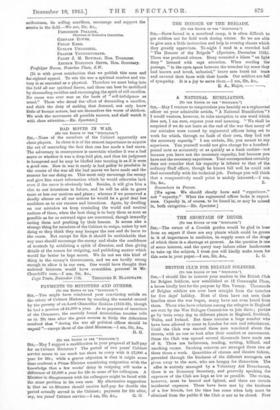BAD MOVES IN WAR.
To MR EDITOR OP Till " SPECTATOR :1 Sfea—None of the members of the Cabinet apparently are chess players. In chess it is of the utmost importance to acquire the art of concealing the fact that one has made a bad. move. The adversary in consequence is uncertain whether it was a bad move or whether it was a deep-laid plot, and thus his judgment Is hampered and he may be bluffed into treating it as if it were a good one. New in war it surely is bad policy to proclaim in the course of the war all the bad moves we have made and the reasons for our doing so. This must only encourage the enemy and give him exact information which he would otherwise lack even if the more is obviously bad. Besides, it will give him a clue to our intentions in future, and he will be able to guess more or less our motives and plans ; whereas if we preserved a deadly silence on all our actions ho would be a good deal lees confident as to our reasons and intentions. Again, by dwelling on our mistakes we keep reminding the world and neutral nations of them, when the best thing is to bury them as soon as possible as far as outward signs are concerned, though inwardly noting them and profiting by their lessons. It seems also a strange thing for members of the Cabinet to resign, unless by not doing so they think they may hamper the rest and do harm to the. cause. But except for this it should be unthinkable that any man should encourage the enemy and shake the confidence of neutrals by exhibiting a spirit of disunion, and then giving details of the reason for resigning, and publishing matter whioh would far better be kept secret. We do not see this kind of thing in the enemy's Government, and we are hardly strong enough to allow it in our own. One would have thought that national interests would have overridden personal in Mr. Churchill's case.—I am, Sir, &o.,










































 Previous page
Previous page